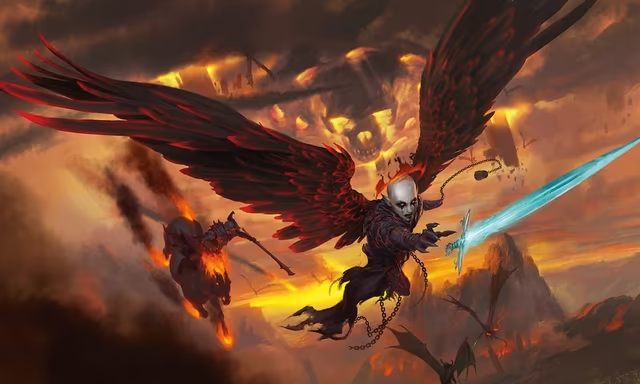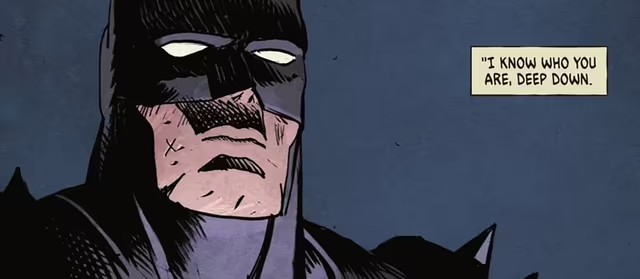If you click on a link and make a purchase we may receive a small commission. Read our editorial policy.
Critical Role's Matt Mercer and a bit of restraint are the secret sauce to making Shroud the biggest villain of Dispatch Season 1
AdHoc Studio devs say they're surprised they're "not getting more shit for" how little Shroud is in Dispatch Season 1, but they found the right amount of Matt Mercer to give us.

Popverse's top stories
- Where to find Popverse at Seattle's Emerald City Comic Con 2026
- The Traitors US alum Bob the Drag Queen drops a piece of advice for future players: "You are not as good at this game as you think you are"
- Bridgerton season 4 ending explained - did Benedict and Sophie make it work, and who's leaving the show for good?
One of the highlights of Dispatch Season 1 has been the deliciously villainous Shroud. He is the mastermind behind all of Robert/Mecha Man’s pain, and AdHoc Studio knew that they had to use him exactly enough to make him as menacing as possible. Of course, having Matt Mercer deliver those lines – both the threatening and the hilarious – helps give Dispatch the villain it needed.
“To be honest… we didn’t set out to, like, on Dispatch and be like, you know, oh… this is a story about a guy who is out for revenge,” AdHoc Studio’s Nick Herman told us when we spoke to him and Dennis Lenart about Dispatch. “Like, it’s a theme, it’s a thing, but, like, really… what we wanted the focus to be on is, you know, more of the, you know, the Mighty Ducks or the, you know, Bad News Bears or whatever version of, like, you know, disgruntled, sad, alcoholic guy who used to be good at something is no longer able to do that and has to deal with a bunch of jerk offs. And that was the, like, we knew that that was like the core of it. So we were very focused on that for a long time, to the point where, you know, we went, ‘Oh, shit. We're making a superhero thing, we should probably put superheroes in.’”
Shroud, as a villain, had to stand out, but that was tougher than you’d think. As Herman explained, “You’re hanging out with villains the whole experience."
"Like, you’re surrounded by bad guys, and then you were like, now we need the baddest guy to come in, and for you to want to kill him or… tempt you with this. And I remember we’re discussing, like, how do we do that? Because we’re also making this comedy. And like, how do you make a new villain be seen worse? And really, like, the thing we landed on was that all our other villains are funny. Let’s make him, like, when he’s in the room, like he sucks the fun out of everything.”

“Like, he's not, you know, entertaining. He's very dry. He's very, like, you know, he's not, like, monologuing in these, like, big dramatic ways. It's very kind of, like, flat and, like, not fun. Which that was, like, the thing that we were trying to do with Matt in the booth and with the characters. Keep him even-keeled. Keep him flat. Keep him menacing. And then, as we get closer and closer to his demise, he gets funnier and funnier.
“I don't know if people enjoy it as much as I think Matt is so funny by the end, and he's, like, losing his shit. And it's, like, ‘You see that, you fucking fucks?’ Like, he starts, like, he, I think Pierre [Shorette] described it once as, like, he becomes, like, peak incel,” Herman concluded.
It isn’t just the writing of Shroud that made him intimidating, Dennis Lenart said that it was two-fold.
“Matthew Mercer. Always helps,” he said. However, the fact that we don’t see much of him is also key to the character’s success. “It worked in our advantage to have him not be around as much, which, you know, you're building this mystery, and the tough part is, when he does show up, he has to deliver. So, that was always the risk, but I think, fortunately, it worked out where it's, like, you know, the animation, the art direction, performances, like, the writing, like, everything came together in that moment when it needed to, which was extremely important for that to work. Or it would have just been, oh, that was a letdown. I've been waiting all season for that?”
“To be honest, I’m kind of surprised Shroud worked,” Herman added. “Or that people aren’t like… we’re not getting more shit for it. Like, you know, him not being seeded more or, like, being part of the season. It was definitely something we were conscious of. Like, we have to make sure we kind of nail each one of these.”
Continue the story with our deep dive into Dispatch with a conversation with AdHoc Studio's two main developers. If you're still confused after that, here's the Dispatch season 1 ending explained and how they changed it at the last minute.
Follow Popverse for upcoming event coverage and news
Find out how we conduct our review by reading our review policy
Let Popverse be your tour guide through the wilderness of pop culture
Sign in and let us help you find your new favorite thing.















Comments
Want to join the discussion? Please activate your account first.
Visit Reedpop ID if you need to resend the confirmation email.